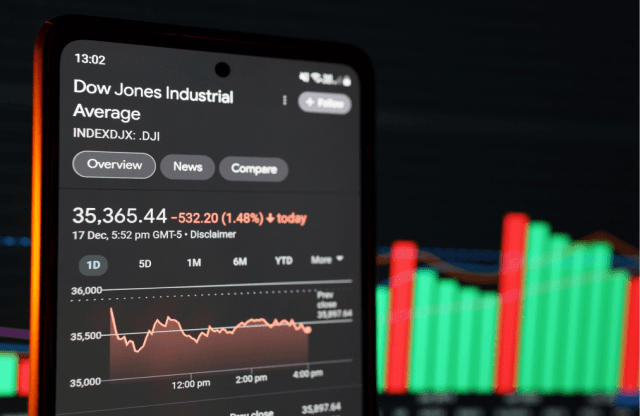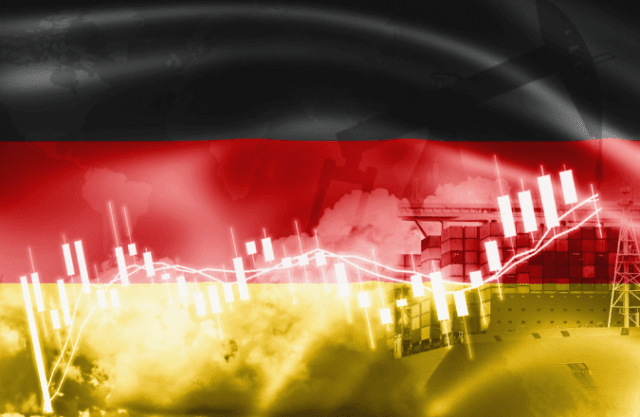A complete guide to trading the FTSE MIB

Learn all about the FTSE MIB index, from its price journey to what moves its value, as well as the live Italy 40 share price.
What is the FTSE MIB?
The FTSE MIB, traded as the Italy 40 on Capital.com using CFDs and officially known as the Financial Times Stock Exchange Milano Indice di Borsa, is a stock market index for the Borsa Italiana of Italy, representing the performance of some of the largest and most recognised Italian stocks. The index is composed of 40 companies across sectors including banking utilities, manufacturing, and more.
The selection of companies in the FTSE MIB is calculated in real-time using a weighted average of the prices of its constituent stocks. This means that larger companies have a greater impact on the index's movements. The index is managed by FTSE Group, a global provider of financial indexing and benchmarking services, and a wholly-owned subsidiary of the London Stock Exchange Group.
Like other major indices such as the Dow Jones Industrial Average, the FTSE MIB is often used as a gauge for the overall health and performance of the domestic stock market and economy.
What is the FTSE MIB price history?
The FTSE MIB was established in 1992 as the primary benchmark for the Italian stock market. Replacing the MIK-30, it initially tracked 30 of the largest companies on the Borsa Italiana. In 2004, it expanded to include 40 companies.
2008 saw the index price see a significant decline as the global economic crisis devastated share prices worldwide. Like many global indices, the FTSE MIB saw a sharp fall during the global financial crisis, reflecting widespread panic and uncertainty in financial markets.
In 2009, the index's administration was transferred from Standard & Poor’s to the FTSE Group, and it was officially renamed the FTSE MIB.
The European debt crisis of 2011-2012 was a major hit to Italian businesses as high public debt and banking sector vulnerabilities came to the fore. The index saw substantial losses during this period, but 2015-2017 represented a period of recovery alongside structural reforms in Italy and improving economic conditions in the eurozone.
In 2018, political instability in Italy, including budgetary disputes between the government and the European Union, caused notable volatility and a sharp decline in the index. And in 2020 the Covid-19 pandemic led to significant market downturns worldwide, with the FTSE MIB no exception. The index dropped sharply as lockdowns and economic uncertainties weighed heavily on investor sentiment.
Despite the severity of the downturn, 2021 saw a strong rebound, reflecting global recovery efforts and vaccine rollouts, which bolstered investor confidence. And in 2022-2023 continued recovery led to index resilience despite ongoing global economic challenges, including inflation and geopolitical tensions.
In 2023 the FTSE MIB reached new highs, reflecting robust performance from key sectors such as banking, energy, and industrials, supported by ongoing economic recovery in Italy and across Europe.
What factors might affect the performance of the FTSE MIB?
The performance of the FTSE MIB may be impacted by a range of key fundamental events. Here are a few of the main factors:
- Economic indicators: the overall state of the Italian economy, measured by GDP growth, unemployment rates, and consumer confidence, have a strong influence on the price of the flagship index. Also, since Italy is a eurozone member, the wider European economic outlook can impact the domestic index. Find out more about the potential fundamental conditions that can hit indices by exploring our market analysis.
- Monetary policy: monetary policies set by the European Central Bank, particularly interest rate decisions, are significant levers affecting the index. Lower interest rates reduce the cost of borrowing, encouraging investments and generally leading to rises in stock prices. Similarly, actions like quantitative easing, which increase money supply and asset purchases, inject more capital into the economy, fostering investment and uplifting the stock market. However, the index price can be driven lower by factors such as increased interest rates and higher inflation.
- Political stability: Italy’s politics, such as government changes, political crises, elections and general faith in fiscal policy can cause volatility in the index.
- Industry trends/innovation: Italy’s stock index price can be moved disproportionately by the performance of key industries that dominate the FTSE MIB, like energy, telecoms and manufacturing. In turn, these industries are beholden to factors like major commodity prices like oil and gas, consumer sentiment, and more.
- Geopolitical events: events such as trade disputes, international conflicts, and other major events can cause movements in the index price based on their capacity to impact supply chains, consumer demand, and other key factors integral to stock performance.
What companies are in the FTSE MIB?
The FTSE MIB comprises some of Italy’s leading businesses, such as multinational electricity and gas distributor Enel S.p.A, automotive manufacturer Stellantis NV, banking group Intesa Sanpaolo S.p.A, and semiconductor company STMicroelectronics NV.
What are the FTSE MIB stock market hours?
The FTSE MIB stock market hours are based on the hours of the Borsa Italiana, which operates its regular trading session from 8:00am to 8:30pm local time, or 7:00am to 7:30pm UTC. Learn more about stock market trading hours for a full understanding of trading sessions and timings.
If you choose to trade CFDs, you can follow the FTSE MIB performance live with the comprehensive FTSE MIB price chart.
Monitoring the index’s activity can help you to keep an eye out for any key fundamental or technical events that may affect short-term movements in the price.
How to trade the FTSE MIB with CFDs
If you want to take a position on the FTSE MIB, you have a choice of methods. First, you can trade a derivative product such as a contract for difference (CFD) on the stock market price using leverage. A CFD is a financial contract, typically between a broker and a trader, where one party agrees to pay the other the difference in the value of a security, between the opening and closing of the trade.
Using a CFD, you can either hold a long position (speculating that the FTSE MIB price will rise) or a short position (speculating that it will fall). This is considered a short-term investment or trade, as CFDs tend to be used within shorter timeframes.
CFDs are traded on margin, which means that a trader can get exposure to larger positions with a relatively small outlay. This amplifies the potential profits, but also the potential losses, making such trading risky. You can learn how to trade shares in our comprehensive guide to shares trading.
Aside from CFDs, you can also trade the FTSE MIB through instruments like options, ETFs, and mutual funds. Options allow for speculative investment with controlled risk, ETFs enable straightforward stock-like trading of the index, and mutual funds offer a managed, buy-and-hold approach to tracking its performance. Each offers an alternative to the leveraged trading of CFDs, catering to different risk management approaches and investment strategies.
To trade share CFDs with us, just sign up for a Capital.com account, and once you’re verified, you can use our advanced web platform or download our intuitive yet easy-to-use app. It’ll take just a few minutes to get started and access the world’s most-traded markets.
Why trade index CFDs with Capital.com?
Trading index CFDs with Capital.com means you’ll enjoy an intuitive, easy-to-use platform, 24/7 support, fair and transparent pricing, along with award-winning education to help build your experience in the markets.* You can seamlessly integrate our smart platform with elite third-party software TradingView and MT4, and refine your strategies with our risk-free demo.
If you’re looking to master indices trading try our step-by-step indices course.
*Awarded best-in-class for education at ForexBrokers.com’s 2024 Annual Awards
FAQs
Why is the FTSE MIB important to traders?
The FTSE MIB is seen as a useful barometer for the performance of Italy’s wider economic performance and a bellwether for domestic economic trends. As such, financial commentators and traders watch the performance of the index in relation to key fundamental events such as interest-rate decisions and GDP, which give wider clues on economic progress and potential index movement.
What affects FTSE MIB prices?
The FTSE MIB, which represents 40 of Italy’s most high-profile listed companies, is influenced by various factors like economic data, global economic conditions, sector-specific changes, and successes or failures of the largest, most influential stocks in the index.
What is the Italy 40?
The Italy 40 is the name of our tradeable CFD market on the FTSE MIB index. The Italy 40 price you see with us tracks the price of the underlying FTSE MIB, enabling you to take a long or short position on the index.
Visit our other complete guides

How to trade the Dow Jones
